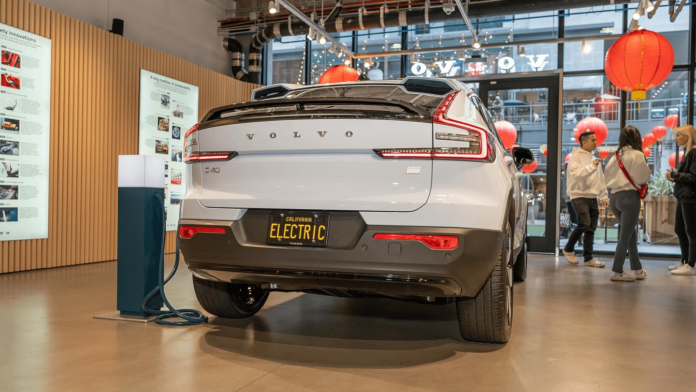Volvo announced Wednesday that it has scales back its plans to make only electric vehicles (EVs) by 2030. Instead, the Swedish company — majority-owned by China’s Geely — will continue to offer hybrid models as part of its lineup.
Despite this shift, the company has said that it still intends to have over 90 percent of its sales be comprised of EVs and plug-in hybrids by 2030, with the remaining percent will be represented by “a limited number of mild hybrid models to be sold, if needed.”
While hybrid vehicles typically use regenerative braking to recharge the battery while a car is in use, plug-in hybrids contain a larger battery that must be charged externally and are typically more expensive up front, according to Kelley Blue Book.
The U.S. Energy Information Administration has reported that a combined 18.7 percent of light-duty vehicle sales in the second quarter of 2024 were comprised of EVs, plug-in hybrids, and hybrids.
Hybrid sales accounted for the largest share of these sales, coming in at 9.6 percent. 7.1 percent of car sales were represented by EVs, while plug-in hybrids had a market share of just 2 percent.
A study by J.D. Power revealed that one of the primary reasons those looking to purchase a new car reject EVs is a lack of charging station availability. This concern was cited by 52 percent of those who said they were either somewhat or very unlikely to consider purchasing an EV.
Other reasons for not buying an EV included the vehicle’s purchase price, their limited driving distance per charge, the length of time it takes to charge, and the inability to charge at home or work.
Among those whose said they have a daily commute between 46 minutes and an hour each way, only 24 percent said they were “very likely” to consider buying an EV, down 13 percentage points from 2023.
[RELATED: EVs Are 63 Percent More Expensive Per 1,000 Miles Driven Annually Compared to Gas-Powered Cars — iSeeCars Study]
Earlier this summer, Maine announced that $8.6 million worth of high-speed EV chargers would be installed throughout the state across 17 locations.
The installation of these 52 chargers was funded in part by a $5.7 million federal grant awarded through the National Electric Vehicle Infrastructure (NEVI) Program, a $7.5 billion initiative of the 2021 Infrastructure Investment and Jobs Act.
$2.8 million in state taxpayers’ dollars was also allocated for the project through the Governor’s Maine Jobs and Recovery Plan, which is Gov. Janet Mills’ (D) blueprint for investing nearly $1 billion in federal funds intended to help Maine recover from the effects of the COVID-19 pandemic.
About $100,000 worth of settlement funds from the New England Clean Energy Connect project were put toward this effort as well.
[RELATED: Maine to Spend $8.6 Million Installing 52 EV Chargers Across 17 Locations Statewide]
Volvo’s decision to scale back its plans for electrification comes not long after Ford announced that it would be canceling the development of a fully-electric three-row SUV and delaying the roll out of a new full-size electric pickup truck.
Instead, the Michigan-based auto manufacturer has opted to pursue a gas-electric hybrid model three-row SUV that will allow for a greater driving range at a more affordable price.
[RELATED: Ford Cancels Plans for Fully-Electric Three-Row SUV, Shifts Overall EV Strategy]
At the same time, however, Ford will also be pursuing the introduction of a fully electric commercial van in 2026, as well as two fully electric pickup trucks in 2027.
That said, a “range of propulsion options” will be made available for the next generation F-Series Super Duty pickup truck.
The company will also be reducing the percentage of annual capital expenditures dedicated to “pure electric vehicles” from 40 percent down to 30 percent.
Several months ago, the Maine Board of Environmental Protection (BEP) rejected a controversial proposal that would have mandated that 51 percent of new car sales in Maine be comprised of EVs by model year 2028 and 82 percent by model year 2032.
[RELATED: Maine BEP Rejects Controversial EV Mandate]
Shortly thereafter, a handful of environmental groups sued the Maine Department of Environmental Protection (DEP) and the BEP for allegedly failing to do enough to cut greenhouse gas emissions in the state, particularly by voting down the proposed EV mandate.
[RELATED: Environmental Groups Sue Maine in Effort to Force Adoption of Controversial EV Mandate]
Involved in the lawsuit are the Conservation Law Foundation (CLF), Sierra Club, and Maine Youth Action (MYA).
These Plaintiffs are asking the Cumberland County Superior Court to declare that the State’s decision to reject this mandate was “arbitrary, capricious, and an abuse of discretion,” as well as to compel State to adopt the mandate, or a comparable alternative, by November 1 of this year.

